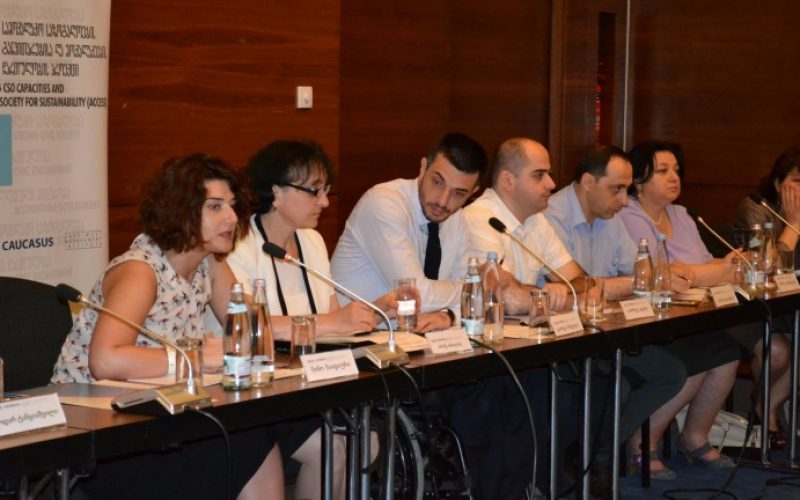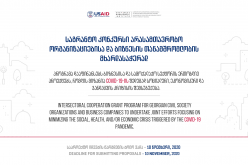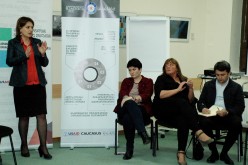Policy Forum – Reforming the Disability Policy: Dialogue between the State, People with Disabilities and CSOs

On July 12, EWMI ACCESS organized a policy forum dedicated to discussing the state policy toward the people with disabilities and the major problems faced by this group. The policy-makers from the Georgian Parliament, Ministry of Labor, Health and Social Affairs, State A gency for Social Services, Public Defender’s Office, and independent experts and CSO leaders came together to speak openly about Georgia’s progress towards implementing the UN Convention on the Rights of Persons with Disabilities
gency for Social Services, Public Defender’s Office, and independent experts and CSO leaders came together to speak openly about Georgia’s progress towards implementing the UN Convention on the Rights of Persons with Disabilities
and the remaining gaps, as well as the ongoing process of transitioning from the so-called “medical model” to “the social model” of care, and the newly initiated legal capacity and mental health system reforms.
More specifically, the first half of the forum focused on reviewing the medical and social care models, discussing the advantages of the social care model relative to the medical one, and identifying the priority actions required from the Georgian government and other stakeholders to effectively introduce and integrate the social model throughout the country. The Deputy Minister of Health and Social Affairs of Georgia presented the plans of the government to improve support to the persons with psycho-social needs. The state increased funding for the disabled by three million GELs and set up a Consultation Council with the Public Defender’s Office to provide guidance and advice to the people with disabilities and their family members on the disability rights and programs.
The CSOs commended the government for developing and adopting an Action Plan on Introducing the Social Care Model, but criticized it for the poor implementation. Apart from the lack of adeq uate financial resources to implement the Action Plan, the CSOs highlighted the problem of a severe shortage of required professionals on the ground as the biggest challenge (currently, there are only 32 certified occupational therapists in Georgia). The government’s failure to effectively implement the Action Plan and provide efficient legislative and institutional frameworks for its implementation was also highlighted in the Public Defender’s Report.
uate financial resources to implement the Action Plan, the CSOs highlighted the problem of a severe shortage of required professionals on the ground as the biggest challenge (currently, there are only 32 certified occupational therapists in Georgia). The government’s failure to effectively implement the Action Plan and provide efficient legislative and institutional frameworks for its implementation was also highlighted in the Public Defender’s Report.
The second part of the forum focused on the abolishment of the legal incapacity model. In October 2014, the Constitutional Court of Georgia declared the legal incapacity anti-constitutional. In result, the Georgian government began implementing the reform that replaced the definition of an “incapacitated person” with a “person in need of support” and revised the rights of and the state approach toward these persons. One of the authors of the reform legislation, MP Tamar Kordzaia spoke about the details of the reform implementation and highlighted the key accomplishments and shortfalls in this process. According to her, the state must work further to raise awareness among the affected groups about the newly introduced changes and develop effective, state-sponsored services to the persons in need of support to help them benefit from the reform. Currently, there are 3,484 officially registered persons in need of support. The state does not have a detailed information about the individual needs of these persons. Neither does it have the adequate resources to build capacities of local authorities in Georgia’s regions to increase their role in the successful and timely implementation of the legal incapacity reform.
The participating CSOs and policy-makers also discussed the most optimal institutional framework for pushing forward the positive changes in these areas as they agreed that the current Inter-agency Council was ineffective in fulfilling this function.















Leave a Reply